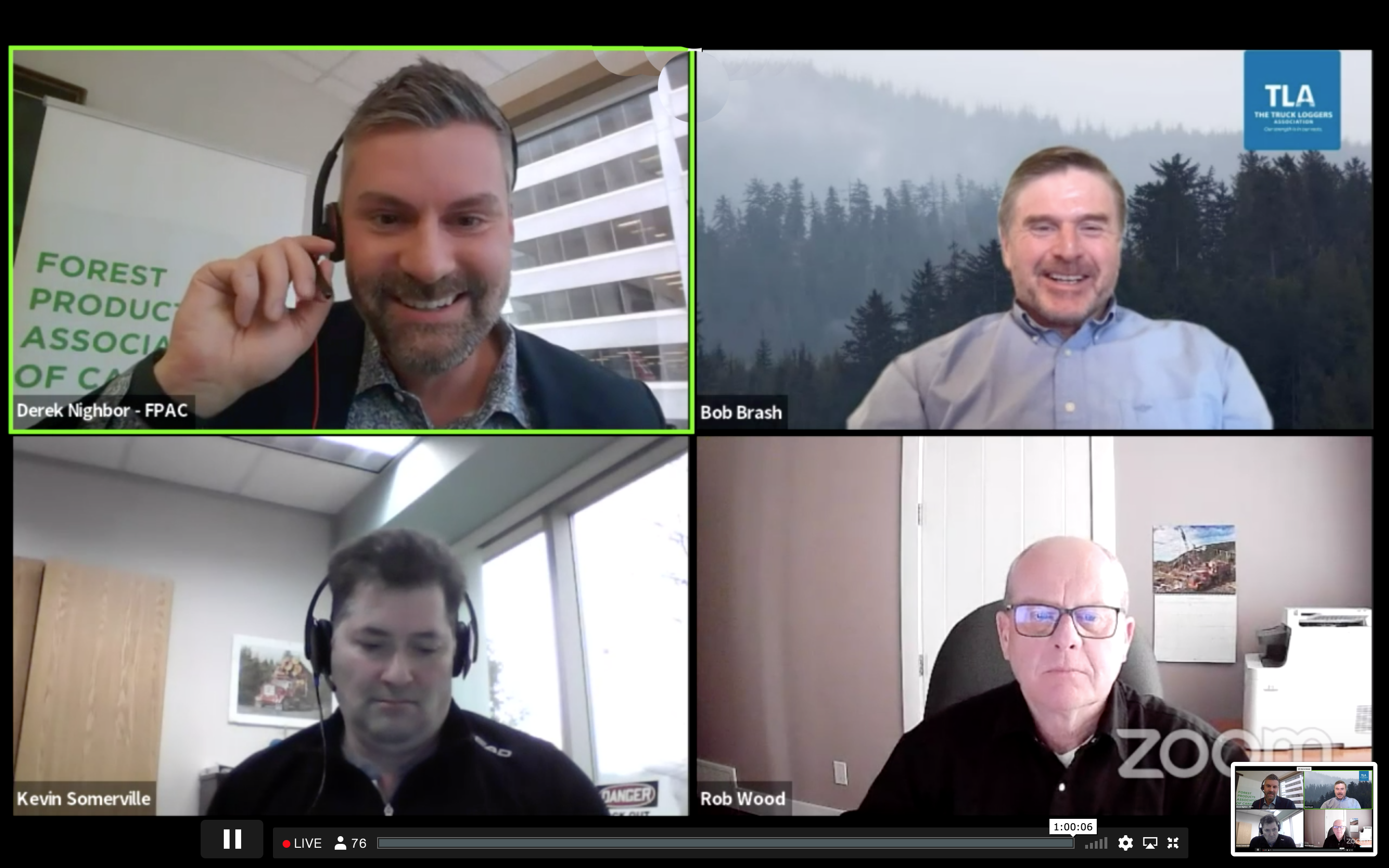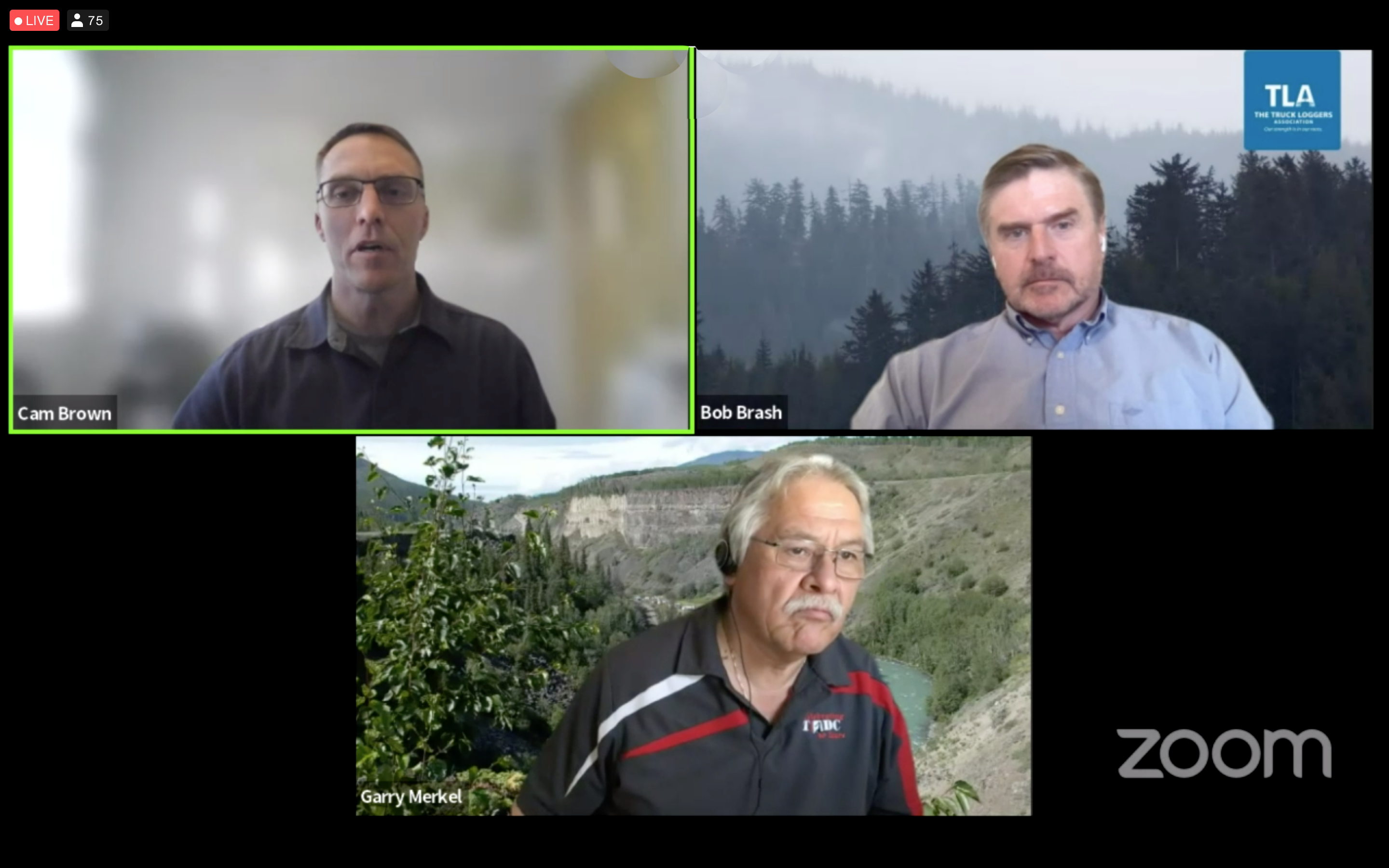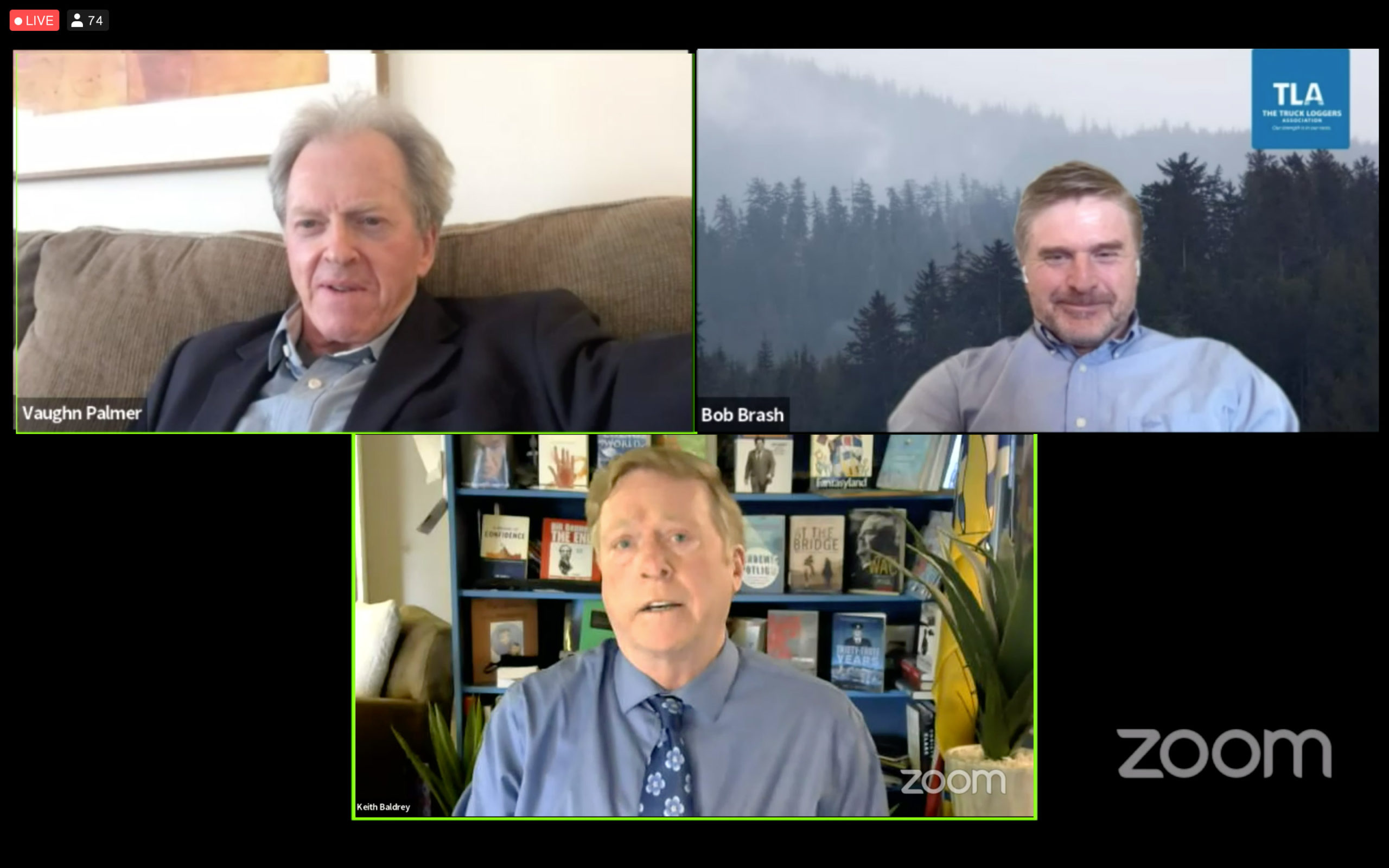Building on the success of panel sessions in January—held to initiate meaningful discussion on the impacts of policy directions taken by the NDP government— the Truck Loggers Association (TLA) followed-up with panels on industry’s social licence and competitiveness, old-growth logging and media and politics in BC. Moderated by TLA Executive Director Bob Brash, below are select highlights from the three panel sessions.
 The first session was titled How industry can reconcile social licence and improve competitiveness of BC’s Forest Sector. Rob Wood of Holbrook Dyson Logging opened with his perspective on why the forest sector is at a cross-roads, despite record lumber prices of late. Wood referenced several high-profile initiatives over the past two decades (notably the Liberal’s 2003 Forestry Revitalization Act and the recent policy and old growth initiatives by the NDP in 2021), which have “failed to revitalize industry or support local contractors and forest dependent communities”. Most concerning for Wood is the current government’s refusal “to even engage and listen to the TLA and the fact that they appear to have given up on the forest sector altogether.” Kevin Sommerville of the San Group, said his company’s efforts to secure and retain social licence starts with support for the First Nation reconciliation efforts of the provincial and federal governments. Next on San Group’s list is creating jobs and giving back to the community, and doing more with less via value-added manufacturing. The Forest Products Association of Canada’s Derek Nighbor noted the sector’s communication challenge but also the rewards of efforts such as their outreach to “urban moms and millennials”. Nighbor said that recent polling on industry’s reputation shows progress is being made and that the forest sector is “the envy of other industries”. Key messaging topics for FPAC include Canada’s strict forest laws; how the working forest contributes to conservation; Canada’s leadership in forest certification, and the role forestry plays in achieving net zero emissions and building resiliency in the face of climate change.
The first session was titled How industry can reconcile social licence and improve competitiveness of BC’s Forest Sector. Rob Wood of Holbrook Dyson Logging opened with his perspective on why the forest sector is at a cross-roads, despite record lumber prices of late. Wood referenced several high-profile initiatives over the past two decades (notably the Liberal’s 2003 Forestry Revitalization Act and the recent policy and old growth initiatives by the NDP in 2021), which have “failed to revitalize industry or support local contractors and forest dependent communities”. Most concerning for Wood is the current government’s refusal “to even engage and listen to the TLA and the fact that they appear to have given up on the forest sector altogether.” Kevin Sommerville of the San Group, said his company’s efforts to secure and retain social licence starts with support for the First Nation reconciliation efforts of the provincial and federal governments. Next on San Group’s list is creating jobs and giving back to the community, and doing more with less via value-added manufacturing. The Forest Products Association of Canada’s Derek Nighbor noted the sector’s communication challenge but also the rewards of efforts such as their outreach to “urban moms and millennials”. Nighbor said that recent polling on industry’s reputation shows progress is being made and that the forest sector is “the envy of other industries”. Key messaging topics for FPAC include Canada’s strict forest laws; how the working forest contributes to conservation; Canada’s leadership in forest certification, and the role forestry plays in achieving net zero emissions and building resiliency in the face of climate change.
 The second TLA panel was on the management of old growth, featuring two seasoned RPFs; Garry Merkel, participant of the BC government’s Old Growth Review Panel, and Cam Brown of Forsite Consultants. According to Merkel a paradigm shift is required in BC. “We need to think like an ecosystem and manage for ecosystem health. In practice, this means keeping enough old growth with a broad distribution of types to limit biodiversity loss, and to avoid small old-growth patches to limit excessive edge effect.” Brown presented on the different old-growth strategies that are required for different Natural Disturbance Types (e.g. high and low frequency of disturbance types, and disturbance dependent ecosystems). According to Brown, “we can and should improve how we manage old growth. The deferrals are useful but we need to incorporate local knowledge and practical realities.”
The second TLA panel was on the management of old growth, featuring two seasoned RPFs; Garry Merkel, participant of the BC government’s Old Growth Review Panel, and Cam Brown of Forsite Consultants. According to Merkel a paradigm shift is required in BC. “We need to think like an ecosystem and manage for ecosystem health. In practice, this means keeping enough old growth with a broad distribution of types to limit biodiversity loss, and to avoid small old-growth patches to limit excessive edge effect.” Brown presented on the different old-growth strategies that are required for different Natural Disturbance Types (e.g. high and low frequency of disturbance types, and disturbance dependent ecosystems). According to Brown, “we can and should improve how we manage old growth. The deferrals are useful but we need to incorporate local knowledge and practical realities.”
 The final session was a journalists political discussion with Vaughn Palmer of the Vancouver Sun and Keith Baldrey from Global News. Key observations made include:
The final session was a journalists political discussion with Vaughn Palmer of the Vancouver Sun and Keith Baldrey from Global News. Key observations made include:
- The NDP government is less activist and less chaotic than NDP governments of the past, due in large part to Premier Horgan
- The pandemic has provided the NDP with a lot of cover but politics-as-usual is returning with issues like inflation and housing affordability
- Forestry’s future lies in First Nations partnerships, tenure and revenue sharing
- Establishing a new Ministry of Lands as a means to solve land use conflicts will take time and it has been tried in the past without success
- The Western Forest Products/Huu-ay-aht accord is the government’s hope for old-growth deferrals
- The Fairy Creek legal decision revealed how well organized, funded and extensive ENGO’s law-breaking tactics were
- A pending redistribution of seats will add to urban areas at the expense of rural areas, reducing industry’s political clout and profile
- Working with local government, MLAs and First Nations is key to ensuring forestry’s voice is still heard